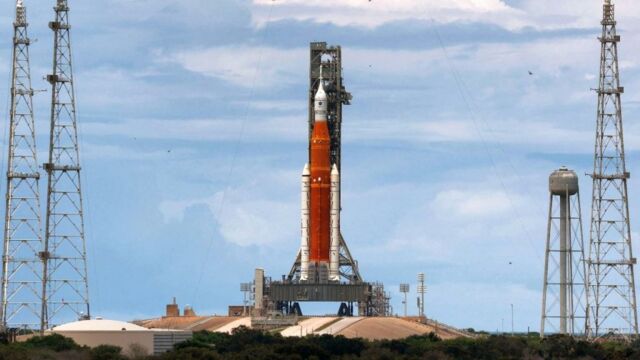Today, Monday 29 August,NASA is launching the first rocket slated to take humans to and from the moon since 1972 - that’s 50 years ago.
Discover our latest podcast
The Space Launch System (SLS) rocket is scheduled to launch atop an unmanned Orion crew capsule from the Kennedy Space Center on Cape Canaveral in Florida today at 8.33am ET (1.33pm UK time).
'Not going to go as you expect'
However, NASA Administrator Bill Nelson told NBC’s Meet the Press yesterday that its Artemis I test flight launch might not go to plan. And that's not because of the lightning strikes at the launchpad over the weekend, which Jeff Spaulding—the senior NASA test director for this mission—said caused 'no issues, no concerns or constraints,' as reported by The New York Times.
Rather, Nelson said, as reported by New York Post:
You can expect in a test flight that everything is not going to go as you expect it to. That’s part of a test flight.
That’s part of, for example, developing aircraft. That’s why you have a test pilot. But we’re pretty confident about this.
He added:
This first flight is a test. We test it, we stress it. We make this rocket and the spacecraft do things that we would never do with a human crew.
The main purpose of the flight is to test the heat shield because you can’t test that in a lab. So if the heat shield survives and does what it is expected to do, it’s a successful test.
First stop the moon, next Mars
Artemis I is a test mission for eventually returning astronauts to the moon, including the first woman, with the ultimate aim to finally send astronauts to Mars. Nelson said:
This time we’re going back, we’re going to live there, we’re going to learn there.
We’re going to develop new technologies, all of this so we can go to Mars with humans.
They may be floating worlds, they may be the surface of Mars. But this is just part of our push outward, our quest to explore, to find out what’s out there in this universe.
Read more:
⋙ NASA's Artemis I: Here are all the details from its mission to launch date
⋙ A huge rocket is plummeting to Earth, scientists can’t tell where it’ll land















